Neuroscience Next Step For Human Rights
Siobahn Hotaling is a singer-songwriter and founding member of the New York Artists Collective. With her degree in psychology, Siobahn Hotaling has been putting her skills to the cause of addressing implicit bias and advancing human rights.
Human rights are, interestingly enough, a relatively new phenomenon, with the term being coined in the early 1800s - strange, because for most people the concept of universal human rights seems like an obvious part of a fair society. However, with the events of the 2020 pandemic and the following bitter political divisions and violence, the exact meaning and application of human rights has come under scrutiny.
Researchers at Brown University, Rhode Island have introduced a new lens through which to view human rights that they call "dignity neuroscience.” According to their research, many declarations of human rights over the centuries (including prototype human rights like the Cyrus Cylinder and Magna Carta) have had similar tenets at their core since all human beings share the same basic nervous system.
All humans have the same hierarchy of needs, the same response to trauma, and the same desire for autonomy. Those feelings are intrinsic to the structure of the human brain, say researchers, which requires any discussion of human rights to have an inherently universal angle to be legitimate. Similarly, the concept of bias is also intrinsic to the structure of the human brain. Siobahn Hotaling has studied both of these concepts and has created an implicit bias program - called the Implicit Bias Transformation Program - that seeks to reconcile the internal human struggle of recognizing common humanity while battling our inherent tendency to see "others" as a threat.



Comments
Post a Comment